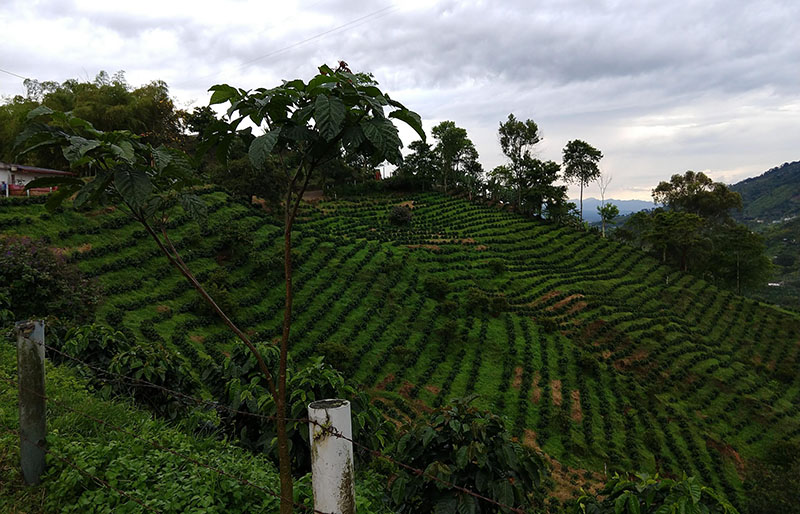Keeping Colombian coffee crops healthy
Graduate student aims to help coffee farmers share information about climate change's impact on crops

There are many places in the world with delicate climates or precarious geography where climate change has already altered people’s ways of life. The coffee farmers in the coffee-growing region of Colombia, Risaralda, are one such population, vulnerable to even slight variances in weather that can threaten their lives and livelihoods.
Jessica Eise, a Ph.D. student in the Brian Lamb School of Communication, saw this first-hand when she visited Colombia on assignment for her previous job as a communications director for the Department of Agricultural Economics at Purdue.
Colombia’s geography ranges from snow-capped mountains to warm beaches to dense rainforests with micro-climates in between. Those whose work is directly impacted by the climate, such as farmers, often struggle to adapt their production practices to manage climatic changes, with their crops at risk from climate change-induced impacts such as damage from pests, drought, or erosion. New cycles of the climate means changing 100-year-old practices to keep their farms going.
And it is usually those on the lower end of the socioeconomic scale who first must deal with these seemingly insurmountable problems.
“Climate change does not treat everyone fairly. For example, there are different geographies in the world that experience climate change more acutely, and Colombia is one of those regions,” Eise said. “Ironically, and unfairly, often the regions that feel climate change the most today are areas that produced less greenhouse gas as compared to Europe, the United States, and China.”
Eise, in collaboration with Colombian researchers at the Universidad Tecnológica de Pereira and Natalie Lambert, an assistant professor in the Lamb School, set out to study the coffee farmers of Risaralda and their adaptation efforts. What are the problems they face? How do they deal with them? What structures are in place to help expedite their efforts?
The study, funded by a Global Synergy Grant, the Lamb School, and the Purdue Climate Change Research Center, is not just to shed light on a different perspective of climate change, nor only collect and analyze data, but rather to also engage with the coffee farmer population and produce results that will have a material effect.
“I took the name of the Global Synergy Grant seriously,” Eise said. “It tried to truly create a reciprocal relationship, because climate change is a global problem that we all have to work together on.”
From the Universidad Tecnológica de Pereira came John Mario Rodriguez, professor of biology, Diana Meza Sepulveda, adjunct professor of agri-business and chemistry, and Sebastian Rios Sanabria, an undergraduate research assistant. Eise also enlisted the help of Madison Moore, a Purdue undergraduate research assistant, to help process the data back home.
The first phase of the project required the Colombian team and Eise to pile into a van and travel all day, sometimes going from 5 a.m. to 9 p.m., to reach coffee farms across the region. These farms, built into the sides of hills and mountains, take time to reach, and many farmers do not have regular access to the internet.
The researchers wanted to know how they conceptualized climate change and how climate change was affecting their work today. From the responses, they found that many farmers were experiencing a great deal of uncertainty.
“Both the conditions they’re working under – the weather, environment, pests, erosion – and the financial pressures – their worries that they might not be able to continue this way of life – were reflected in the experience of uncertainty,” Lambert said. “The finding about uncertainty was important because if we hadn’t unveiled the uncertainty process and developed interventions, we would’ve failed completely.”
The second phase of the project, which is ongoing, is to create a Colombian advisory board of coffee farmers, coffee farming association leaders, and researchers that will oversee a tool to disseminate resources and information to coffee farmers across Colombia. This tool will unite the farmers and help them share advice and possible solutions to keep their crops healthy. This project is funded by a second Global Synergy Grant and additional funding from the Lamb School.
“Listening to the coffee farmers, who came from diverse backgrounds, they were very (aware) that they were suffering from climate change,” Meza said in Spanish. “It was inspiring to see how open they were to learning and trying new things. Really, it was a testament to the power of these coffee farmers – they are organized and ready to work collaboratively.”
Rios, too, knows that this effort to work together must continue.
“We know that Colombia is an agricultural country with hardworking people,” Rios said in Spanish. “And as academics, we are called to collaborate in the best ways we can to help move forward.”
Because of its interdisciplinary nature, communication can be an effective vehicle to integrate solutions that conceptualize and act upon these global problems.
“It is the invisible linchpin to surviving, adapting, and mitigating climate change,” Eise said.